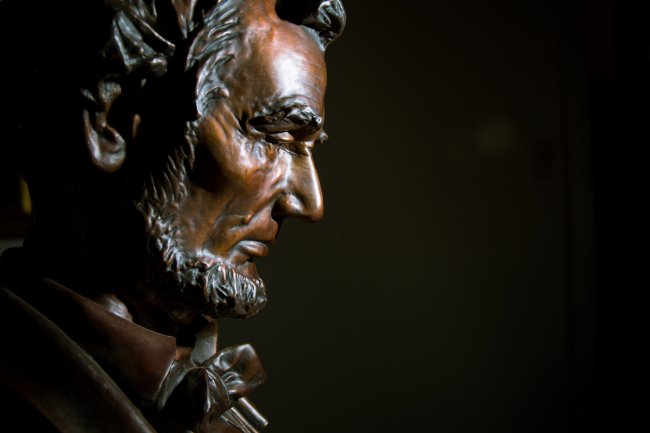
The Gilder Lehrman Institute of American History and Gettysburg College announced on February 15 that Caroline E. Janney, author of “Ends of War: The Unfinished Fight of Lee’s Army after Appomattox” (The University of North Carolina Press), is the recipient of the 2022 Gilder Lehrman Lincoln Prize.

Janney is the John L. Nau III Professor of the American Civil War and director of the John L. Nau Center for Civil War History at the University of Virginia (UVA). A graduate of UVA, she worked as a historian for the National Park Service and taught at Purdue University before returning to UVA in 2018. An active public lecturer, she has given presentations at locations across the globe. Janney is the past president of the Society of Civil War Historians and a series editor for the University of North Carolina Press’s Civil War America series. She has published seven books, including “Remembering the Civil War: Reunion and the Limits of Reconciliation” (2013) and “Buying and Selling Civil War Memory in Gilded Age America” (2021).
She will be recognized on April 14, during an award ceremony to be held at the Harvard Club in New York City. The award includes a $50,000 prize and a bronze replica of Augustus Saint-Gaudens’s life-sized bust, Lincoln the Man.

Janney’s “Ends of War” is a dramatic new history of the weeks and months after the Battle of Appomattox. It reveals that Robert E. Lee’s surrender was less an ending than the start of an interregnum marked by military and political uncertainty, legal and logistical confusion, and continued outbursts of violence. Janney takes readers from the deliberations of government and military authorities to the ground-level experiences of common soldiers. Ultimately, what unfolds is the messy birth narrative of the “lost cause,” laying the groundwork for the defiant resilience of rebellion in the years that followed.
“Deeply researched and beautifully written, ‘The Ends of War’ lets us see into the hearts and minds of Confederate soldiers in the crucial weeks and months of the Civil War’s fitful end,” said President of the Gilder Lehrman Institute of American History James G. Basker. “It is one of the best history books I have ever read, and the story she tells still resonates in our country today.”
Basker is one of the four Gilder Lehrman Lincoln Prize Board members who selected this year’s winner. In addition to Lewis E. Lehrman, a co-founder of the Gilder Lehrman Institute of American History and co-creator of the Gilder Lehrman Collection alongside the late Richard Gilder, other board members include Robert C. Daum, a trustee of the Gilder Lehrman Institute of American History, and Gettysburg College Trustee Larry D. Walker.
“Dr. Janney’s fascinating research sheds new light on an often-overlooked subject—how does war end for the common soldier—which resonates still today even as it did at the end of the Civil War,” Walker said. “This book places you beside the Confederate soldier as he wrestles with surrender, the nature of the war’s ending, and the cause for which he sacrificed. A groundbreaking work.”
The laureate was one of seven finalists recommended to the board by a three-person jury: Jonathan W. White, award-winning author and professor of American studies at Christopher Newport University; Carol Reardon, George Winfree Professor emerita of American history at Pennsylvania State University and adjunct professor of Civil War era studies at Gettysburg College; and Amy Murrell Taylor, T. Marshall Hahn Jr. Professor and 2020-21 Distinguished Professor in the Department of History at the University of Kentucky College of Arts and Sciences.
The jury wrote in their report to the board, “[Janney’s] narrative seamlessly blends military, social, and political history, taking readers across the war-torn landscape as individuals and groups of soldiers decide what their next steps will be. By slowing down the pace of the story, Janney brings readers back to those contingent moments when the war’s outcome still seemed unclear. The story Janney tells is so compelling that readers may, at times, forget that they already know the outcome. In short, Janney succeeds in saying something new and important about the Civil War, using a diversity of voices, including soldiers and civilians, political and military leaders, and freedpeople.”
The six other finalists that the jury selected from 91 nominations include:
- Andrew F. Lang, “A Contest of Civilizations: Exposing the Crisis of American Exceptionalism in the Civil War Era” (University of North Carolina Press)
- Kate Masur, “Until Justice Be Done: America’s First Civil Rights Movement, from the Revolution to Reconstruction” (W. W. Norton)
- James Oakes, “The Crooked Path to Abolition: Abraham Lincoln and the Antislavery Constitution” (W. W. Norton)
- Alaina Roberts, “I’ve Been Here All the While: Black Freedom on Native Land” (University of Pennsylvania Press)
- John M. Sacher, “Confederate Conscription and the Struggle for Southern Soldiers” (Louisiana State University Press)
- Kevin Waite, “West of Slavery: The Southern Dream of a Transcontinental Empire” (University of North Carolina Press)
Read about past recipients of the Lincoln Prize.